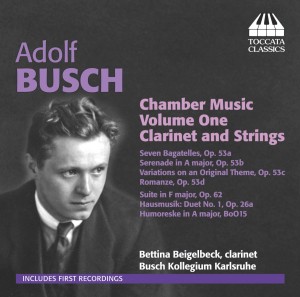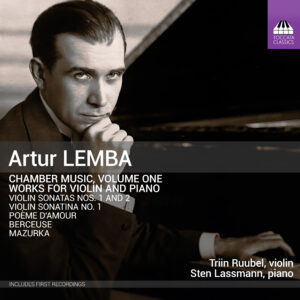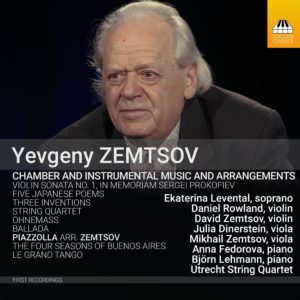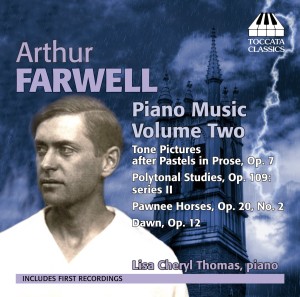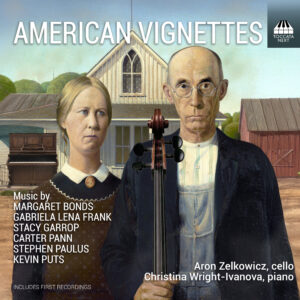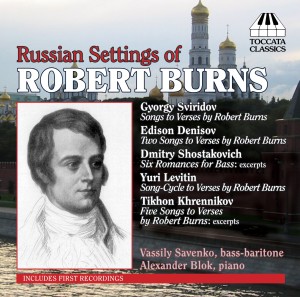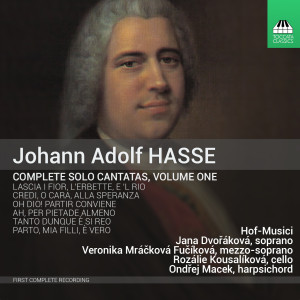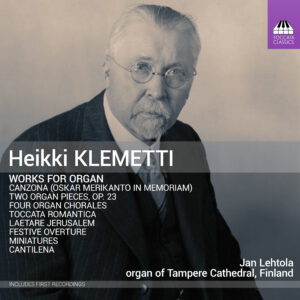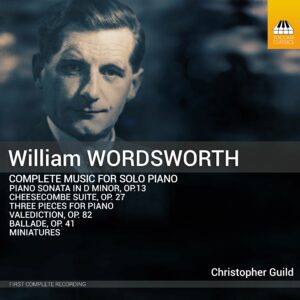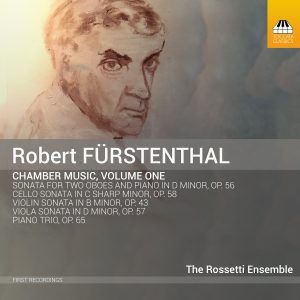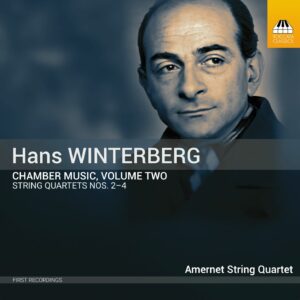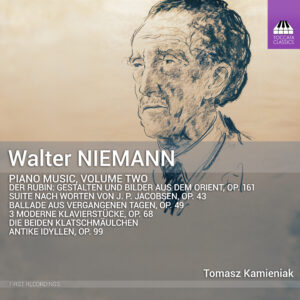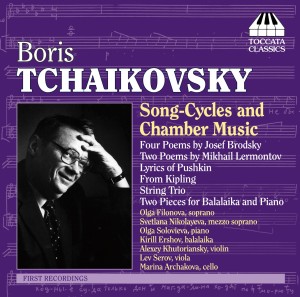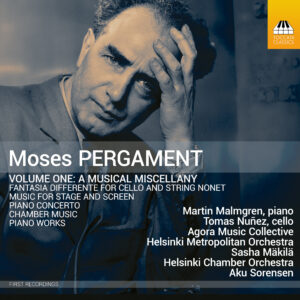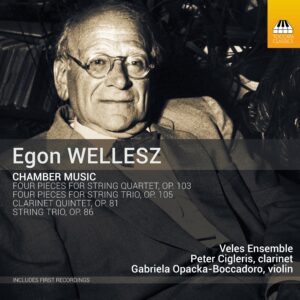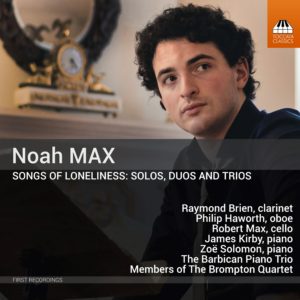Search Results for "Space Wolf: The First Omnibus mp3 torrent" – Page 9
Adolf Busch: Chamber Music, Volume One
Adolf Busch (1891-1952) enjoys a reputation as one of the greatest of all violinists: his recordings of Beethoven with the Busch Quartet have never been surpassed. But Busch was also one of the major composers of his day, equally natural as contrapuntist and melodist, with a style that owed much to his boyhood idol, Max Reger. Yet, always a man of principle, he sacrificed his career as both violinist and composer with his dignified refusal to perform or be performed in Nazi Germany. This CD of his lyrical writing for clarinet, the first in a series of recordings of Busch's light-filled chamber music, is part of the rediscovery of one of the leading musicians of his day.
Bettina Beigelbeck, clarinet
Busch Kollegium Karlsruhe
Artur Lemba: Chamber Music, Volume One
The music of Artur Lemba has been strangely neglected, even in his native Estonia – although during his lifetime (1885–1963) he was held in high regard as pianist and teacher. That oversight is all the more surprising in view of the expansive, passionate lyricism of his writing – listeners who enjoy the music of Tchaikovsky and Rachmaninov are likely to find Lemba’s appealing. This first release in a pioneering series discovering his chamber music is accompanied by two historical recordings, one with the composer himself at the piano, and the other, a century old, of the one Lemba miniature to achieve some degree of popularity.
Triin Ruubel, violin
Sten Lassman, piano
Yevgeny Zemtsov: Chamber and Instrumental Music and Arrangements
The Russian composer Yevgeny Zemtsov (1940–2016) may be as well known for the dynasty of musicians – most of them violists – that he fathered than he is for his own music. This first album ever to be devoted to his compositions features works from the beginning and end of his career: a with some early violin works, influenced by Tchaikovsky and Prokofiev, a Bartókian string quartet, three spirited and spiky piano miniatures, an oblique piano elegy and five late, enigmatic, almost ritualistic settings of Japanese haikus. Late in life, too, he discovered a fascination with tango, and the album also features his elegant arrangements for string quartet of two Piazzolla favourites.
David Rowland (violin) – Track 4
David Zemtsov (violin) – Track 5
Anna Fedorova (piano) – Tracks 4,8,11
Björn Lehmann (piano) – Track 5
Ekaterina Levental (soprano) – Track 12
Julia Dinerstein (viola) – Track 21
Utrecht String Quartet
Eeva Koskinen (violin)
Katherine Routley (violin)
Mikhail Zemtsov (viola)
Sebastian Koloski (cello)
Arthur Farwell: Piano Music, Volume Two
The American composer Arthur Farwell (1872-1952) is remembered as the leading member of a group of 'Indianists' who used Native American tribal melodies. But Farwell's stylistic range was much wider than is realised today. This second CD of his piano music presents not only two Indianist pieces but also the early character-pieces Tone Pictures after Pastels in Prose and the experimental Polytonal Studies, which pit two different keys against each other to generate unusual harmonies.
Lisa Cheryl Thomas, piano
American Vignettes: Contemporary Works for Cello and Piano
Though quintessentially American in spirit, the musical snapshots in this album are as diverse as the men and women who composed them. Drawing from influences as disparate as the blues, jazz, Broadway, gospel, folksong and the wild west, these ‘American vignettes’ merge popular idioms into a new canon of the repertoire for cello and piano. The distinctive voices of six US composers, from the late twentieth and early 21st centuries, here come together to weave a virtuosic and colourful tapestry of Americana.
Aron Zelkowicz, cello
Christina Wright-Ivanova, piano
Russian Settings of Robert Burns
Robert Burns enjoyed a particular following in both Imperial and Soviet Russia as an idealised 'people’s poet’. In the mid-twentieth century Samuel Marshak’s best-selling translations of Burns came to rival Pushkin in popularity and provided a fresh stimulus to Soviet composers – some of whom may have seen Burns’ radical views as a useful cloak for their own non-conformist views.
Vassily Savenko, bass-baritone
Alexander Blok, piano
Johann Adolf HASSE: Complete Solo Cantatas, Volume One
In his own day Johann Adolf Hasse (1699–1783) was enormously popular as a writer of operas – Burney described him as ‘superior to all other lyric composers’. His chamber cantatas were written for private performance in the palaces of the powerful, where Hasse enjoyed the patronage of the very highest ranks of society: some of his cantatas may even have been sung by the empress Maria Theresa herself. But with the eclipse of his fame after his death, these works were scattered across Europe, and this first complete recording was made possible only by many years of detective work. They reveal, even on this smaller scale, the keen sense of drama that animated his operas.
Featuring:
Hof-Musici
Jana Dvořáková, soprano
Veronika Mráčková Fučíková, mezzo-soprano
Rozálie Kousalíková, Baroque cello
Ondřej Macek, harpsichord
Heikki Klemetti: Organ Music
Heikki Klemetti (1876–1953) was one of the most important figures in the Finnish music of his day: author, organiser, musicologist, editor, educator, folksong collector and, above all, choral composer. His work as an organist and composer for the organ has largely been forgotten, an omission this first-ever album of his organ music seeks to correct. The influence of Ostrobothnian folksong can readily be heard, and there are obvious points of contact with the musical language of Sibelius, not least in the unemphatic dignity and nobility of the style, with the modal harmonies occasionally calling to mind another of Klemetti’s contemporaries: Vaughan Williams.
Jan Lehtola, organ of Tampere Cathedral, Finland
William Wordsworth: Complete Music for Solo Piano
The reputation of the Anglo-Scottish composer William Wordsworth (1908–88), great-great-grandnephew of the poet, has recently been restored by a series of Toccata Classics albums of his orchestral music. His piano music, too, was poorly known before now, none of it recorded since a handful of pieces appeared on LP 60 years ago – though his epic Piano Sonata is a work of major importance. This first ever complete recording reveals an honest, unfussy approach to the keyboard akin to that of two other major symphonists, Sibelius and Rubbra: like them, Wordsworth’s primary concern seems to have been the expression of deep feeling – which makes the gentle story-telling of his miniatures for children all the more surprising.
Christopher Guild, piano
Robert Fürstenthal: Chamber Music, Volume One
When Germany invaded Austria in 1938, Robert Fürstenthal, born in 1920, took the path of many Viennese Jews and fled to the United States, where he made his living as an accountant; the fact that he had written music in his youth was soon forgotten. Reconnection, after 35 years, with the woman who had been his first love rekindled both that flame and his urge to compose, and from then on songs and chamber music flowed from his pen, preserving the spirit of fin-de-siècle Vienna under the Californian sun – ‘When I compose, I am back in Vienna’, he explained. He died in November 2016, aged 96, knowing that his lyrical, eloquent music was at last attracting the attention of both musicians and microphones.
The Rossetti Ensemble
Malcolm Messiter (oboe)
Christopher O’Neal (oboe)
Sara Trickey (violin)
Sarah-Jane Bradley (viola)
Timothy Lowe (cello)
John Lenehan (piano)
Hans Winterberg: Chamber Music, Volume Two
The life of the Prague-born composer Hans Winterberg (1901–91) reads like the outline of a detective novel. Having survived internment in the Terezín (Theresienstadt) ghetto as a Czech Jew, after the War he settled in Munich as a German citizen, and his music enjoyed a number of broadcasts – but after his death his estate disappeared into the vaults of a research institute and was placed under embargo, emerging only in 2015, since when recordings and performances have revealed him as one of the major Czech voices of the twentieth century. This first recording of three of his four string quartets – their language downstream from Janáček and Schoenberg, with folk-music roots refracted through mid-century Czech modernism – confirms Winterberg’s standing and underlines his importance as a lone survivor of the group of young Czech composers whose infinite promise was extinguished in the Holocaust.
Amernet String Quartet
Walter Niemann: Piano Music, Volume Two
The largest part of the output of the Hamburg-born composer and writer Walter Niemann (1876–1973), a student of both Humperdinck and Reinecke, is piano music: an astonishing 1,000 or so pieces, divided into 189 opus numbers. Most of them are lyrical miniatures in a warm and approachable late-Romantic style, some evoking the music of the past – often with a touching degree of dignity and restraint, but also with an occasional flash of good humour.
Tomasz Kamieniak, piano
Boris Tchaikovsky: Song-Cycles and Chamber Music
Boris Tchaikovsky (1925-96) – no relation to his better-known namesake – was one of the leading Russian composers of the twentieth century. A student of Shebalin, Shostakovich and Myaskovsky at the Moscow Conservatory, Tchaikovsky soon evolved an individual style that steered clear of ideology and fashion. Paradoxically, the apparent simplification of his musical language and growing refinement of its gestures sharpened its emotional impact. Tchaikovsky’s music has recently been attracting attention in the West; this CD closes some of the gapes in his growing discography.
Olga Filonova, soprano
Svetlana Nikolaeva, mezzo soprano
Olga Solovieva, piano
Kirill Ershov, Balalaika
Alexey Khutoriansky, violin
Lev Serov, viola
Marina Archakova, cello
Moses Pergament Volume One: A Musical Miscellany
The neglect of Moses Pergament (1893–1977) can be ascribed in part to the complexities of his life: he was born in Finland of Lithuanian-Jewish stock, a student in Russia and a Swedish citizen by 1919. As a result, no national culture stepped forward to claim him, with his outsider status initially worsened by blatant anti-Semitism – and the gradual realisation that he was one of the most interesting Swedish composers of the mid-twentieth century then fell away again after his death. This series of recordings aim to return his music to the public ear, beginning with an album tracing the growth of his style, from early Romanticism to a spicy Bartókian vivacity, occasionally animated by Jewish melos and dance-rhythms.
Martin Malmgren, piano
Tomas Nuñez, cello
Helsinki Metropolitan Orchestra
Sasha Mäkilä, conductor
Helsinki Chamber Orchestra
Aku Sorensen, conductor
Egon Wellesz: Chamber Music
In its mix of tonality, Expressionism and Schoenbergian serialism, the late chamber music of Egon Wellesz (1885–1974) – born in Vienna but an Oxford don for almost four decades – marries the mid-century radicalism of his native city with the lyricism of his adoptive homeland. In the first part of his career Wellesz was best known as a composer of operas, and these chamber works were audibly written by someone with a keen sense of drama: in their primal passion, flawless pacing, arching melodic lines and occasional bursts of humour, one can almost imagine them on stage.
Veles Ensemble
Hartmut Richter, violin
Ralitsa Naydenova, viola
Evva Mizerska, cello
Gabriela Opacka-Boccadoro, violin (Tracks 9-15)
Peter Cigleris, clarinet (Tracks 13-15)
Noah Max: Songs of Loneliness: Solos, Duos and Trios
Noah Max – born into a musical family in London in 1998 – has already carved out an impressive career as a composer and conductor; he is also an accomplished painter and a poet. For someone so young, the surprise of this debut album is the sense of loss unifying these pieces. The feeling of innocence forgone is characteristic of the music of many English composers in the first half of the twentieth century, Elgar, Finzi, Howells and Vaughan Williams among them. Max’s music is clearly of its own time, but it shares the elegiac lyricism of those earlier masters.
Raymond Brien, clarinet (track 5)
Philip Haworth, oboe (tracks 16-18)
Zoë Solomon, piano (tracks 1-4, 6-8)
Members of the Brompton Quartet (tracks 9-14)
Maja Horvat, violin
Kinga Wojdalska, viola
Wallis Power, cello
The Barbican Piano Trio (track 19)
Sophie Lockett, violin (track 19)
Robert Max, cello (tracks 1-4)
James Kirby, piano (track 15)
Stay In the Know
JOIN THE TOCCATA NEWSLETTER
"*" indicates required fields
By visiting our site, you agree to our privacy policy regarding cookies, tracking statistics, etc.
